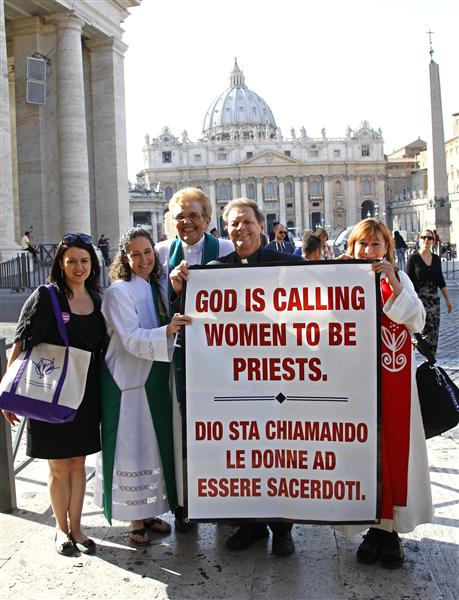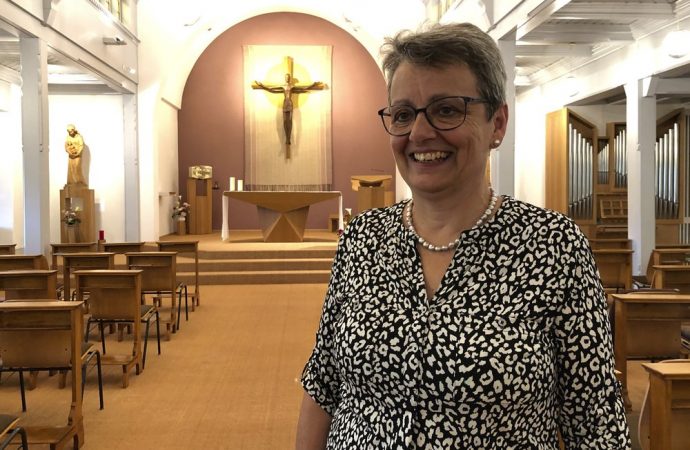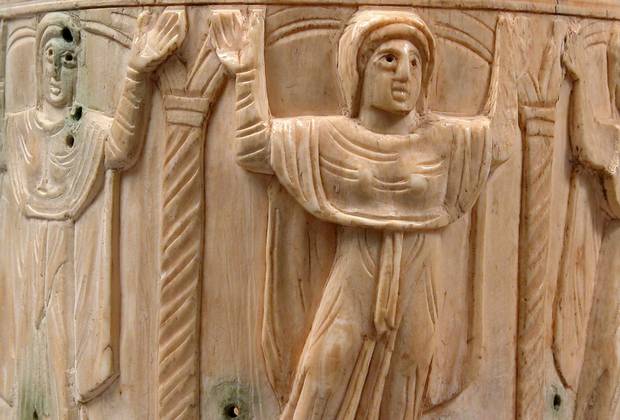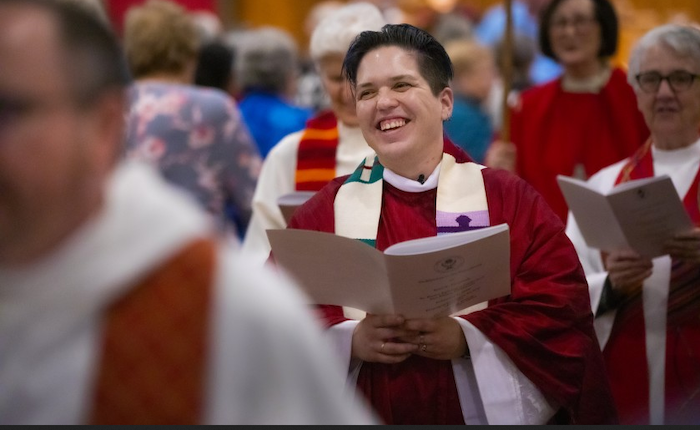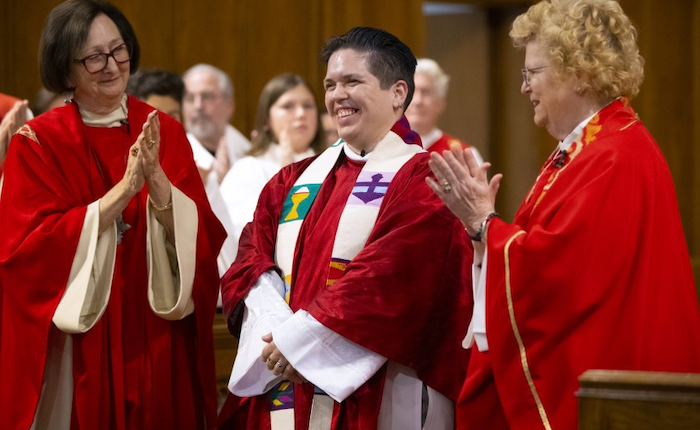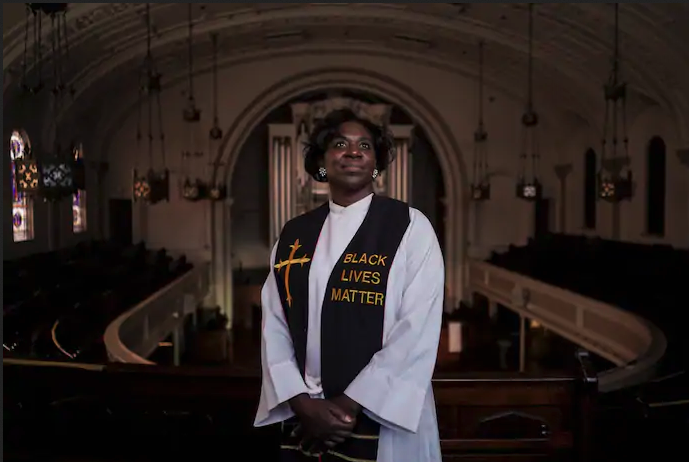
The pop of pepper ball pellets echoed in the night as police converged on demonstrators who gathered in front of a church to protest the death of Daniel Prude.
“Sanctuary!” an activist filming the protest shouted to his peers. “Go inside!”
Protesters streamed into Spiritus Christi Church, a congregation led by the Rev. Myra Brown, one of Rochester’s most vocal advocates for racial justice. That night, she stepped into a new, unofficial role, trying to bridge the divide between a growing group of Rochester residents fed up with city leadership and the officials still struggling to handle a city in crisis
Video of Prude’s March encounter with Rochester police shows him naked, handcuffed and hooded; he died a week later. The images, which were not released until September, sparked days of protest. Prude’s name — along with George Floyd, Breonna Taylor, Rayshard Brooks and other Black Americans killed by police this year — is now invoked in the nationwide racial justice movement.
It also galvanized Rochester, an industrial city on Lake Ontario where residents have, for decades, pushed for police reform and fought against racism
A respected community leader whose golden singing voice fills the church, Brown has the ear of both the city’s leadership and its grass-roots advocates. A former nurse whose ministry is as tied to racial justice as it is to God, she emerged as a key channel of reason and understanding as tensions between police and protesters escalated, helping change the trajectory of the protests.
She was at home when she got the call that the church, home to a breakaway Catholic congregation, was being hit by pepper balls and the injured were taking refuge inside.
“I need you to get your officers to stand down,” Brown told then-Police Chief La’Ron Singletary. After some haggling with the top police official — who has since been fired amid revelations that he may have tried to minimize the department’s role in Prude’s death — a line of officers surrounding the building receded and those taking refuge inside began to leave.
The following day, Brown brokered a deal with Mayor Lovely Warren: the police would pull back and activists could march freely. Brown and 100 “elders” from the community and area churches served as a buffer between protesters and police that night.
The protests stayed peaceful. Brown was later thanked by city officials and painted as a partner in their efforts — a role she said she did not play.
She said she felt “used” by the city. Brown believed she was “negotiating a better path and a better response for the community” in her talks with Warren and Singletary, a goal she was easily behind.
The message, she said, should not have been, “Reverend Myra partnering to save the system.”
‘We like to deny’
Brown believes Rochester has not recognized how that system, along with historical wrongs and discriminatory policies that include putting Black children in substandard schools, have contributed to systemic racism in a city that is 40 percent Black.
“We like to shift the narrative here,” Brown said. “We like to deny.”
Raised in Rochester by parents who were farmworkers in the South, Brown, 55, saw the difference up close when she and other members of a racial justice convoy spent a week in 2017 touring six cities that have significance to their mission. Stops included Selma and Montgomery, Ala. They went to Cleveland, where a police officer in 2014 shot and killed Tamir Rice, a 12-year-old playing with a toy gun.
On the trip, the complicated nature of American racism revealed itself through a candid conversation with a parole officer in Ohio who admitted to feeling like “every Black youth is equally dangerous,” Brown recalled
The officer, who was Black, was worn down by the system and was repeatedly troubled by “the boys he was working with,” Brown said.
Brown, in an essay about the trip, said the group learned that they “must work tirelessly to end racism where we live.”
“To become our best selves,” she wrote, “we must humbly hold ourselves accountable and be open to being held to account when we yield to our worst selves.”
For years, Brown has been working to change Rochester from the pulpit of Spiritus Christi. She spent years worshiping and serving in various positions with the Rev. James Callan, a Catholic priest who violated strict Vatican guidelines by blessing same-sex couples and allowing women to perform the functions of priests. The Vatican forced Callan, who made civil rights the centerpiece of his ministry, from his church.
Callan’s ousting and final Mass was front-page news in the Rochester Democrat and Chronicle: “Huge goodbye to Callan,” the headline read. The mayor at the time told Callan, “Wherever they send you, Jim, give ‘em hell
In 1999, Callan helped found Spiritus Christi, where he is now the associate pastor. Brown was ordained a priest in 2017 and started leading the congregation two years ago. Women are not allowed to be Catholic priests, but Spiritus Christi is not recognized by the Vatican
Brown delivers sermons, wearing a stole with “Black Lives Matter” etched in gold, that highlight a moral obligation to address racial injustices. At a Sunday this fall, a White congregant with a long gray beard showed up to church in a “Black Lives Matter” T-shirt. Equality is Spiritus Christi’s mission.
The church is working on building an outdoor museum in Rochester’s Baden Park — a site of unrest in the 1960s — to raise awareness for the area’s history of housing and employment inequality, and what Brown said was Black community’s mistreatment by police.
Brown tells congregants and community members that the political system was established generations ago by the White, male, elite and was built to serve its creators. She says that modern-day policing is derived from Southern slave patrols. The diversity we see now in government and the private sector is “because people pushed their way in,” Brown said.
Brown, who greets both strangers and friends with her inviting smile, believes Rochester is no exception. Yet she has faith she can help enlighten hearts and minds through education, kindness and respect. It will be no easy task.
“We haven’t done anything to change the structure, we’ve simply moved the pieces around,” she said. “That is why you have what happened to Daniel Prude.”
Brown finds herself working within the confines of what she believes is a broken system, and hoping for the best. She spent four hours facilitating a discussion on race in September with 18 guests, mostly candidates for local office.
The group covered, with her guidance, how the legacy of slavery and broader systems of racism in this country applies to issues they face in their lives and work
New York State Assemblyman Harry Bronson (D) said Brown is able to convey the history that informs structural racism because she is willing to listen to others and treats all with respect.
“Even if they don’t agree with her, they’re open to having those conversations,” he said
Bronson, who is White, said he left with a deeper understanding of White guilt and White fragility, as well as how to recognize racism. Candidates also discussed structural, cultural and institutional racism in society.
“Those kind of thoughts and ideas are going to be beneficial as I continue to develop policy,” Bronson said.
Demond Meeks, a Rochester organizer recently elected to the state assembly, said Brown earns trust by showing respect while facilitating judgment-free conversations about difficult issues.
“She’s someone that can speak to both sides and try to get people to come to a consensus of sorts,” Meeks said
Meeks said community relations with the police have been fractured for years. Many protesters are still haunted by the 2002 fatal police shooting of 14-year-Craig Heard. The eighth-grader was allegedly driving a stolen car. According to the Rochester Democrat and Chronicle, police alleged the boy was trying to run an officer over.
“People are quick to speak about George Floyd and other situations that have happened throughout the country,” Meeks said. “But we have a history of these things happening right here in Rochester.”
Warren said it is “no secret” that Rochester — along with every other city in the country — has issues with systemic racism and police brutality.
“The problems of the past cannot be changed or erased, but we can learn from them,” she said in a statement.
A ‘pathway forward,’ despite a broken system
Days after the video of Prude being detained by police was made public, Brown was among the throngs of protesters gathered in front of Rochester’s Public Safety building — a facility that, to many, represented systemic injustice. The group had been blocked from getting close to the building on previous nights, fueling discontent.
Earlier in the day, Brown brokered a deal with Warren to get the police to pull back its roving detail and allow the activists to march freely. She also pushed for the ability to intervene on site, giving her time to try to diffuse a problem before police responded with force.
On the ground, she and about 100 other elders from the community and area churches were serving as a buffer between the police and protesters. It was tense at times, but the tactic worked: That night was the first of many relatively peaceful ones to come.
Throughout the night, Brown fielded calls from Singletary, who believed some in the crowd were getting out of hand. She convinced Singletary and Warren to give her “at least five minutes” to diffuse situations before officers “start to get trigger-happy and nervous,” she said. The officials agreed to work with Brown.
Brown said her goal was to create a “pathway forward to make sure the community was safe to grieve,” that they “were not attacked by police and not re-traumatized.”
Elders, she reasoned, could provide the life experience and patience that some of the young people needed. They should also be willing to listen.
That night, a young Black man she encountered was visibly hurting, his voice shrill and intense. As others fell silent, he continued to chant by himself in a way that was “coming out sideways,” she said.
Hi sweetie, how you doing?” Brown asked the young man. She saw an opportunity to show him love and see that his hurt did not get the best of him, leading to conflict. She said she asked him in her “softest and gentlest voice” to please lower his volume so she could hear the speaker on the megaphone.
The young man said he was sorry.
“You don’t need to apologize,” Brown said. “I hear the pain in your voice, and I know its real for you, and I’m sorry about whatever you have gone through.”
Ashley Gantt, one of the main organizers of the Black Lives Matter movement in Rochester, said Brown has a reputation for doing good in the area.
“She’s like a mentor, slash activist, slash spiritual counselor,” she said. “And she can sing.”
Activists in Rochester have paused protest activity as coronavirus infection rates rise. They have turned their attention to advocating for a law that would remove police officers from mental health crisis calls like Prude’s, mirroring similar efforts around the country, Gantt said.
Brown’s negotiation with Singletary and Warren resulted in a news conference where she was thanked for her role. In public statements after the meeting, she was painted as a “partner” of those in power, a role she did not agree with. There was also confusion over Brown’s role in bringing elders to the protest; Gantt said others deserve credit for organizing their presence.
“Myra just let the mayor know what was happening, and then the mayor co-opted it,” Gantt said.
Brown was also unhappy with the city’s portrayal of her role as one that denoted a community partnership, which was not her intention.
“I felt used in that,” Brown said. “I never want to be framed as somebody working with the system that’s oppressive for people
In a statement, Warren said those considered to be elders are the most trusted and respected voices in the community and have been “instrumental in bringing together opposing sides.
“The presence of our city’s elders during recent protests and periods of unrest has been vital to the well-being of the Rochester community,” Warren said.
Brown told a Rochester television station that she was ultimately happy to have helped secure “a pathway forward” for the city, and acknowledged it would not have happened without Warren pushing Singletary to stand down.
“I can establish relationships with people without being tied to the oppression,” Brown said.
Complete Article ↪HERE↩!

